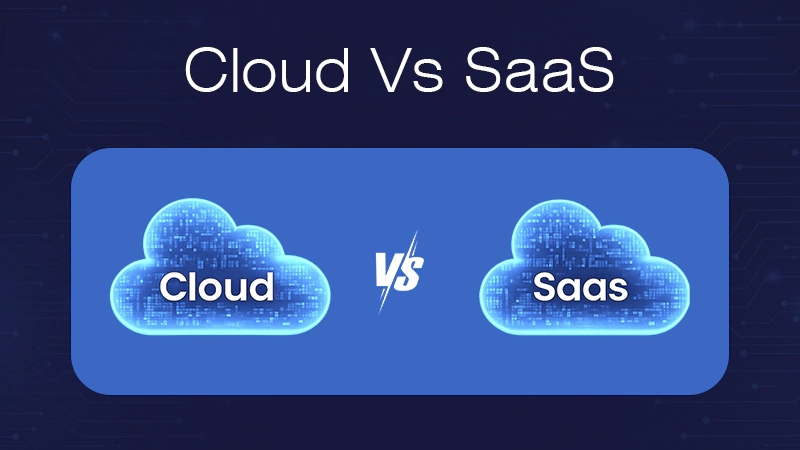Ans: Yes, the Microsoft business suite has scheduling software named Microsoft Bookings that works best in scheduling appointments.
10 Best Scheduling Software Every Business Must Have in 2025
Time is the most expensive resource for every business (big or small), and as an entrepreneur, you cannot waste it. We understand that juggling recruiting, coordinating with clients, checking in with staff, and handling production puts you in a tough spot, but don’t worry; we have a solution for you.
Scheduling software is your secret business partner that can help you streamline tasks, automate workflow, and save you from draining productivity.
In this guide, we’ll introduce you to the best scheduling software in 2025 and explore its features, advantages, pricing, and more. So read the whole article to understand the workforce scheduling software used by businesses worldwide.
What is Scheduling Software?
Scheduling software is a digital tool designed specifically for businesses to automate, organize, and streamline all tasks. These tools are not just mere calendars but a powerhouse that can handle customer queries, staff appointments, and production oversight.
Businesses today have moved way past the traditional methods of manual reporting and handling operations. As the world has become digitalized, businesses rely heavily on good scheduling software for:
- Overseeing staff schedules.
- Organizing meetings and appointments.
- Automating the repetitive tasks.
- Coordinating calendars across teams and departments.
- Sending reminders to clients and team members.
- Reviewing costs and productivity levels.
Whether you are a solopreneur, small business, or a large enterprise, a software for scheduling is an investment worth putting in.
Now that you’re introduced to this life-changing and time-saving tool, let’s go ahead and see why you need it in the next section.
10 Best Scheduling Software You Must Know About
It is very important to handle operations smoothly to keep your business flourishing. Having said that, we know it is also a tough job to find good scheduling software that can work as your team member.
We have curated a list of the best automated scheduling software with their features to help you stay ahead in the game.
1. Calendly

Calendly was founded by a salesperson, Tope Awotona, in 2013 when he himself struggled with scheduling meetings and closing deals. The schedule-building software started its journey with the freemium version and soon became a staple tool for businesses worldwide. This SaaS scheduling tool helps people to book meetings, share calendars, open external slots, and integrate video conferencing and payment services for the business.
Features:
- Simple calendar integration (Google, Outlook, Office 365)
- Automatic analysis of time zones.
- Meeting buffer and time-scheduling alternatives.
- Organizing team and group events.
- Automated alerts and team reminders.
Pricing:
- Calendly has a free version with limited usage that is best for personal use.
- The premium plans for small to large business starts from $10/month.
| Pros | Cons |
| The most beginner-friendly software. | Limited customization options are available in the free plan. |
| Intuitive design and easy-to-understand interface. | |
| Offers a free version, which is best suited for solopreneurs. |
2. Connecteam

Connecteam is a leading scheduling employee software with over 1 million active users worldwide. It provides a complete solution for managers to streamline operations and manage employees. The best part is, it is a mobile-first tool, so every business owner can use it even on the go.
Features:
- It gives drag-and-drop scheduling for shifts.
- Chat and updates for employees within the app.
- A GPS-enabled time clock to check the shift timings.
- Helps in managing tasks and creating checklists.
- Proper analysis and performance assessments.
Pricing:
- Small businesses managing up to 10 employees can get it for free.
- The advanced plans are paid, starting at $29/month.
| Pros | Cons |
| The free plan allows up to 10 users. | The features may feel overwhelming for solopreneurs and personal use. |
| Extensive features compared to the price range. | |
| User-friendly interface. |
3. Deputy
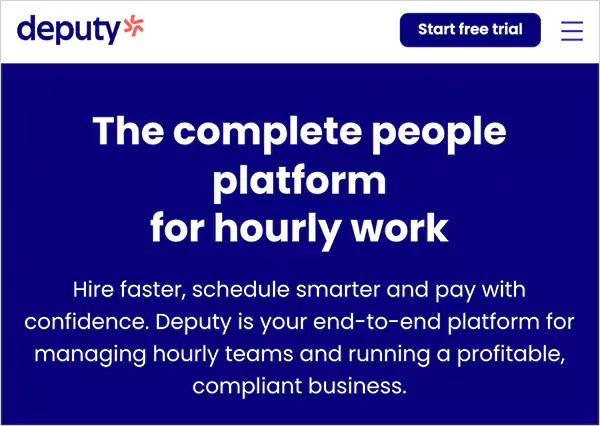
Deputy is a cloud-based enterprise scheduling software that helps businesses with a customer relationship management system, workforce management, payroll scheduling, task management, rostering, and tracking meetings. This tool was founded in 2008 with the aim of resolving labor cost management and coordinating issues that all businesses face.
Features:
- Intelligent planning using AI-generated suggestions
- Tracking attendance in real-time and handling payments.
- Regular alerts for labor law compliance.
- Offers a mobile version with the same features for smooth operations.
- Bonus features like employee self-service for changing shifts.
Pricing:
The basic plan starts at $4/month and goes up to $6 and higher for the premium plan.
| Pros | Cons |
| Offers a 31-day trial period with no credit card requirements. | Do not offer customization options. |
| Pretty affordable solutions for small businesses. | The plans do not include all the business features. |
| Helps in compliance management. |
Check Out: The Rule of 40 in SaaS: Meaning, Benefits, Limitations, and How It Helps Investors and Founders
4. HubSpot Meeting Scheduler
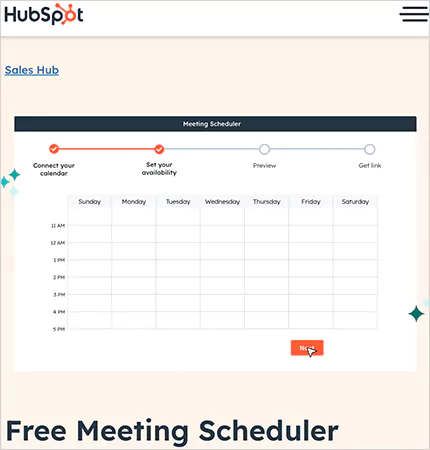
HubSpot Meeting Scheduler is a part of the HubSpot CRM suite, which is among the best for startups. It is a completely scheduling software free tool for businesses across industries. It can automatically spot free times and schedule meetings to save time for both parties. If you already use the HubSpot suite, you can easily enable the meeting scheduler to supercharge your workflow.
Features:
- Tracks the schedule and sends reminders.
- Allows direct integration from the HubSpot CRM suite.
- Helps to create personalized booking links.
- Seamless integration with Google and Office 365 calendars for the entire team.
Pricing:
- Completely free to use.
- The premium version comes with HubSpot Sales Hub, which can go up to $20/month.
| Pros | Cons |
| It works best for managing the marketing and sales part of the company. | Do not offer competitive features for established companies. |
| The features are well-suited for all types of businesses, especially startups. |
5. Zoho Bookings
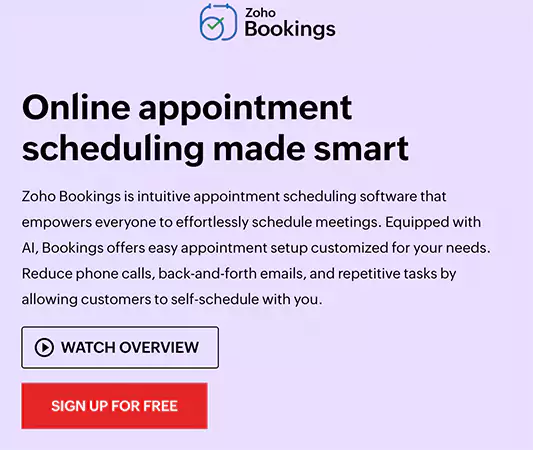
Zoho Bookings is a part of the Zoho business ecosystem. It is an online appointment scheduling tool that helps automate workflows. It gives self-scheduling options, Google and Outlook Calendar management, and sets appointment reminders, which significantly reduces the administrative work.
Features:
- Scheduling for multiple locations and various services.
- Automated notifications and confirmations.
- Seamless integration of payment gateways.
- Personalized branding and white-label solutions.
- In-depth analysis and reporting.
Pricing:
- Has a free plan for small businesses and solopreneurs.
- The paid plan with advanced features starts from $6/month/user.
| Pros | Cons |
| Offers an affordable pricing structure suitable for all sizes of businesses. | The interface is hard to understand for first-time users. |
| Highly customizable features and add-on options. | The reporting and analysis do not gather as much data as the free version. |
| Simple scheduling and smart workflow management. |
6. ReclaimAI

ReclaimAI is a new-gen schedule software powered by Artificial Intelligence that understands the core needs for businesses and provides appropriate solutions. This software program works effectively for small and medium-sized companies to optimize workflows, manage data, schedule appointments, and more.
If you are looking for a solution that can streamline your internal team coordination, Reclaim is the one!
Features:
- Intelligent calendar powered by AI technology.
- Automated scheduling of meetings and events.
- Task blocking based on priority within the team.
- Integration of Slack and Google Calendar to avoid manual scheduling.
- Offers a daily organizer and analysis.
Pricing:
- Reclaim Lite with basic calendar features is available for free.
- The paid starter plans start at $8/month.
| Pros | Cons |
| The best software covering the needs of small businesses. | Has limited features in the free version. |
| Intuitive design and simple navigation. | Do not offer many branding options and customizations. |
| Automatically schedules tasks based on priority. |
7. Clockwise
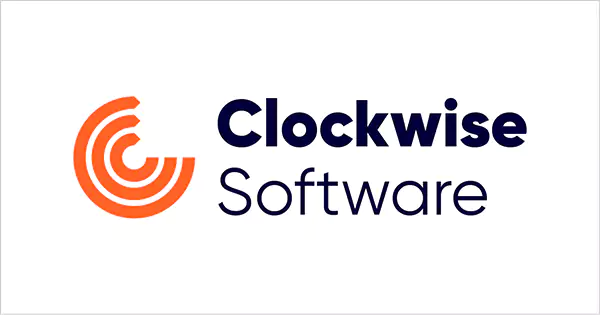
As the business grows, entrepreneurs need the right tool to manage the overlapping meetings, send timely alerts, and schedule tasks accurately. Clockwise is the best scheduling software with built-in optimization features that work best for large enterprises with a huge workload and tasks. The best part is, it even jots down the pointers from the meeting and creates separate folders.
Features:
- AI-driven meeting optimization and note-taking.
- Time protection for focus on priority tasks.
- Coordination of scheduling among multiple teams.
- Integration of Slack, Asana, and Jira.
- Analysis of team performance and monthly review reports.
Pricing:
- Clockwise has a free plan for a single user.
- The team plan starts at $6.75/user/month.
- The business plan costs $11.50/user/month.
| Pros | Cons |
| Custom pricing options for growing businesses. | Works mainly for internal team coordination, with not many features for client scheduling. |
| Offers a free trial period of 30 days. | |
| Has AI-powered automation support and a great helpdesk. |
Check Out: Top ERP System Examples: Best Business Management Tools You Must Know About
8. Vimcal

Vimcal is one of the most loved job scheduling software that can handle a high volume of meetings. Its fast calendar, sleek design, and intuitive interface make it a top choice for all entrepreneurs and businesses. Moreover, it offers the first-ever calendars especially made for executive assistants to manage the office’s duties.
Features:
- Has a lightning-fast loading interface.
- Personalized links for scheduling meetings.
- Can work with keyboard shortcuts to save time.
- Allows connection with primary video conferencing platforms.
Pricing:
- Has a free iOS-only version with basic features.
- The paid iOS & desktop version starts at $12.50/month.
- The business/enterprise plan costs more based on the team members and requirements (price quotations available after filling the enquiry form).
| Pros | Cons |
| Superfast calendar saves time. | Do not offer customization options. |
| Intuitive interface works best for new users. | Charges a high price for premium versions. |
| AI-powered features to optimize the workflow. |
9. SavvyCal

The next in the list of automated scheduling software is SavvyCal, which was founded in 2020 with the focus on building a tool that is simple yet powerful for both the organizer and the invitees.
It allows you to overlay calendars with the preferred time of both parties and pick the overlapping appointment. Whether you are a business consultant or a small business, SavvyCal can help you make neat schedules and to-do lists.
Features:
- Calendar overlay functionality for quicker planning.
- Enables integration with calendars from Google, Outlook, and iCloud.
- Spots and assists with buffer periods, meeting constraints, and individual preferences.
- Top-notch features for handling group meetings and schedules.
- Personalized branding with custom meeting URLs for a polished look.
Pricing:
- The base plan costs $12/user/month.
- The premium plan with custom domains costs $20/user/month.
| Pros | Cons |
| Complete branding options for all types of businesses. | The base plan does not offer customized domains. |
| Strong security with a two-step authentication system. | Limited expansion features for growing businesses. |
| Combines team schedules for a clear overview. |
10. TidyCal
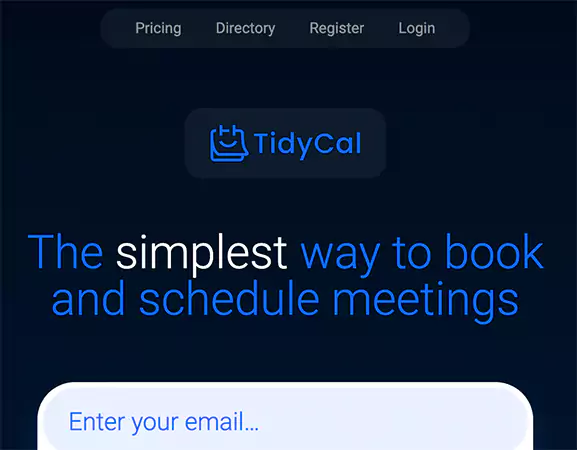
If you want to hassle-free tool that is supportive and functional, TidyCal is the best scheduling employee software alternative for you. This software is built by the AppSumo team to make scheduling meetings simple.
It is among the most used software programs by freelancers, small to mid-size businesses, and solopreneurs for its branding features and group booking options.
Features:
- Single-click integration with Google and Microsoft calendars.
- Sends time-appropriate notifications and confirmation messages.
- Easy-to-use interface for fast configuration.
- Also offers a value-packed lifetime plan for limitless bookings.
Pricing:
- Free version available for small businesses.
- The individual plan costs $29 for a lifetime.
- The agency plan costs $79 for lifetime service.
| Pros | Cons |
| The lifetime pricing makes it affordable in the long run. | Do not offer add-ons or custom solutions. |
| It is very simple to set up and use. | Has limited innovation and integration options. |
| The website and mobile version are great for freelancers and solopreneurs. | Does not work well for a growing business or large companies. |
Why Do You Need a Workforce Scheduling Software?
We all want to keep our businesses up and running like a well-oiled machine, but given the fact that it takes all the time and energy, it is important to have scheduling softwares by your side. Here are a few reasons why your business needs software scheduling:
- Frees Up from Manual Work: Color-coded spreadsheets and manual data entry do not have any space in this fast-paced world. With these tools, you can streamline the whole operation. From scheduling and task allocation to sending reminders, everything is handled seamlessly with scheduling employee software.
- Increases Employee Productivity: When your employees have the right tools, they are happy and more productive. With scheduling software, they can plan their day’s agenda and work on it smoothly.
- Better Customer Experience: Convenience is the one thing that can make your customers happy. These tools allow customers to schedule appointments anytime with just a few clicks. The built-in features, like sending reminders and confirmations, help to build a long-term relationship.
- Scaling Up Businesses: Whether you have a small shop or a big company, scheduling software adapts automatically to your growth. As your customer base increases and you hire new staff, these tools can help you navigate through the complexities.
With these reasons, we are pretty sure you know that it is high time that you get an enterprise scheduling software.
Final Words
Having scheduling software is no longer a choice, but a necessity. As you work hard to keep your business afloat with the world’s changing demands, a software schedule can automate repetitive tasks, manage employee performance, and handle operations.
From Calendly, Deputy, to Connecteam, we have covered the scheduling staff software with their top-selling points and pricing in this blog. We hope this information will help you get rid of manual labor, save your time and energy, and provide your business with the much-needed support it needs. Share the blog with your entrepreneur friend and family members to help them out, too!
Read Next: ERP vs CRM: Understand the Key Differences, Functions, Benefits, and More
FAQs
Q: Does Office 365 have a scheduling tool?
Q: Does Google have scheduling software?
Ans: Yes, Google Calendar is a scheduling tool that lets you mark appointments, send reminders, and manage events efficiently.
Q: What is the most commonly used scheduling system?
Ans: Google Calendar, Microsoft Outlook, and Calendly are popular tools used by all sizes and kinds of businesses worldwide.
Q: What is the best free scheduling software?
Ans: Calendly and Google Calendar are the best scheduling software that allow the use of core features like managing, sharing, and scheduling for free.
Q: Is Outlook a Scheduling Software Free?
Ans: No, it not entirety free. Microsoft Outlook has built-in calendars and scheduling features that help in team coordination and management
Sources:



